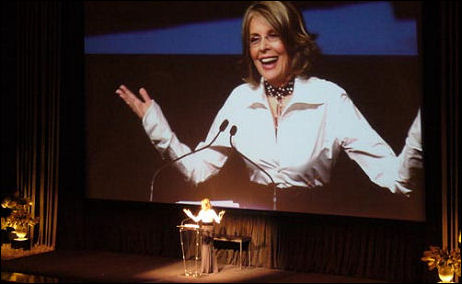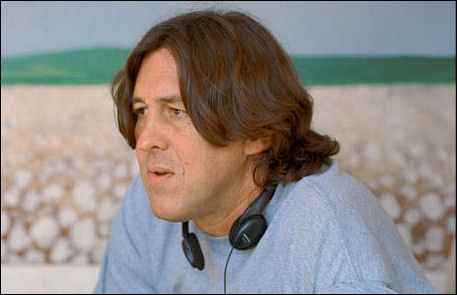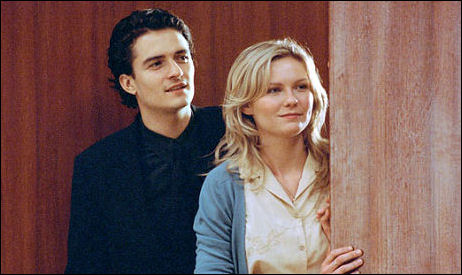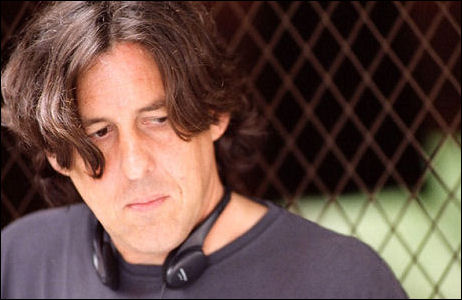A Cinema Blend rumor says that Tom Hanks has agreed to play Professor Robert Langdon again in Angels & Demons, the Da Vinci Code sequel, and that he’s getting paid the “biggest salary ever paid to an actor in the history of Hollywood.” Filming on Angels & Demons “should” start in July, the story says, with Hanks joining costar Gisele Bundchen under director Ron Howard. This means Howard’s Frost/Nixon won’t shoot until the end of the year…do I have that right?
Day: April 10, 2007
Keaton tribute
One question about Stu Van Airsdale‘s video excerpt from last night’s Lincolm Center Diane Keaton tribute, at which Woody Allen, Meryl Streep, Steve Martin, Martin Short and Candice Bergen spoke and praised and shared set stories. The question is, why show a video of Martin’s somewhat funny, somewhat inane banjo performance when we could have just as easily watched and listened to Allen deliver his remarks, which seemed to have been the hit of the evening? What’s with the damn banjo?

“I’m sure you’ve all, at one time or another, heard the term ‘passive-aggressive,’ ” Allen began, drawing the longest laugh of the night with his first utterance. “I only mention this because every film I did with Keaton, I always wrote all the good jokes and all the good stuff and all the good scenes for me. When the picture came out, she was the funny one…she got all the reviews. So, you know, it’s infuriating.
“She called and asked if I would say some nice things [for thsi event], and I asked, ‘What the hell do you want to be honored for?’ Because I could never see the point of being honored; you sit there and there’s adulatory things…you get bathed in obsequious adulation and all that garbage. But she liked that idea, and then I heard the desperation in her voice. So I said okay, Keaton is…’ Allen paused. ‘Punctual? And she’s… thrifty? What else can I say about her?'”
Poland corrects Finke
I should have posted this earlier, but David Poland sussed out the Grindhouse exhibition situation in Portand pretty well last night, and in the process explained how Nikki Finke‘s account missed the bigger picture.
“A simple look at the theaters in Portland via Fandango would show that one of those five non-Regal theaters is, in fact, an independent, one-screen stand-alone theater — the CineMagic,” Poland wrote. “It has been operating under a variety of names since 1914. And, as coincidence would have, less than a mile away from The Clinton. In other words, Weinstein Co did choose a true indie house in that part of Portland√ɬ¢√¢‚Äö¬¨√Ǭ¶ it just wasn√ɬ¢√¢‚Äö¬¨√¢‚Äû¬¢t The Clinton.”
The Oregonian‘s Shawn Levy also weighed in with some local perspective this morning.
Leydon bitchslaps “Grindhouse”
“Right now, the sheer gusto that Robert Rodriguez and Quentin Tarantino take in hot-wiring tired cliches and overly familiar archetypes is highly entertaining, if not downright addictive. But even while [their current collaboration] is most exciting, most deliriously kinetic, it is hard to shake the impression that, sooner or later, these filmmakers really should seek inspiration in something other than other people’s films.”
So said MovingPictureBlog’s Joe Leydon 11 years ago, in a review of From Dusk to Dawn, which Rodriguez directed from a script by Tarantino.
“The appetite for √ɬ¢√¢‚Äö¬¨√ã≈ì70s recycling has greatly diminished during the past decade, [and] audiences have moved on to other things,” Leydon now says, obviously referring to Grindhouse and its box-office failure last weekend. “Maybe it√ɬ¢√¢‚Äö¬¨√¢‚Äû¬¢s time for Tarantino and Rodriguez to do likewise. Maybe long past time.”
Crowe’s downturn & return
Making a bomb of epic proportions sometimes lands a filmmaker in “movie jail” unless he/she has an especially admirable resume. This is what kept Cameron Crowe, the director-writer of Jerry Maguire and Almost Famous, from incarceration over the last year or so following the disastrous reception of Elizabethtown, which opened and quickly died in the fall of ’05. But you can’t go through a major critical and commercial calamity without having it affect you on some kind of woe-is- me, what-the-fuck-am-I-doing? level.

Elizabethtown was Crowe’s Waterloo. I know that it seemed to me and a lot of other journalists like one of the worst wipe-outs ever suffered by a gifted filmmaker. Crowe was mocked, villified, ground into hamburger . And for a while, according to this and that source, he went into a big funk about it and went off to lick his wounds and live with the wolves in the forest. (Who the hell wouldn’t?) But I’m told he’s doing fine emotionally these days, and that he’s working on a script that Adam Sandler wants to star in when it’s ready.
Crowe usually takes a few years between films, so maybe he’ll be back at it next year with the Sandler film (if it comes together in the right way) maybe peeking through in ’09.
I had to ask others what was up because Crowe didn’t get back to me immediately when I wrote him three hours ago.
How bad was Elizabethtown? I was there at that first Toronto Film Festival screen- ing, watching this and that journalist get up and go out for very long bathroom or popcorn breaks, or leaving altogether. It averaged a 28% positive rating on Rotten Tomatoes, it almost killed the career of Orlando Bloom, it seemed to diminish the fortunes of Kirsten Dunst, and for all I know it may have even caused a slowdown in Kentucky tourism.

New Yorker critic David Denby wrote the following in his review: “It leaves one adrift on a raft of morose questions. How could this vacuous movie have got made? Didn’t anyone at Paramount, which paid for the film, read the script? And also: What in the world has happened to Cameron Crowe? At times, the movie became so boring that I experienced the uncanny sensation that I could physically feel the film passing through the projector.”
Elizabethtown had some good things in it (I liked the second half just fine) and Crowe enjoys too much respect and allegiance from too many heavy-hitters to have suffered any serious career trouble because of the reception. But an agent told me today that the feeling he’s been getting is that Crowe is “still feeling a little of that E-Town after-burn.”
The agent explained that in the wake of Elizabethtown that Crowe’s general rep was that of a guy with a reverse Midas touch. People felt a little funny about coming to him with proposals because suddenly he wasn’t the guy who might make another Almost Famous or Jerry Maguire, but a director who had lost his mojo and could possibly turn this or that project into a fart heard ’round the world.
Right around the time of Mission Impossible: 3 Crowe “was attached to do a Tom Cruise romantic film at Paramount,” the agent recalls, “but who knows where that’s languishing these days? Has it gone to UA? Let me get back to you on that.”

A filmmaker who spoke to me this afternoon believes that Crowe had such a smooth and easy ride from the days of Say Anything to Vanilla Sky that he wasn’t able to cope with Elizabethtown‘s total failure.
“Living on that fuel of being the greatest director….getting all that postive energy from everyone and and cruising on all that adulation doesn’t toughen you up,” he says. “It doesn’t prepare you at all for failure. Crowe should have just gotten right back in the saddle [after Elizabethtown]. I spoke to him recently and he was in a great place. Woody Allen has always had the best attitude, I feel. He didn’t take it very seriously when he was applauded and he didn’t take it seriously wen he was panned. He just kept working.”
And that’s what Crowe is back to doing. Good for him, and it’s great to hear about the Sandler thing. Maybe Crowe will get back to me and say something about that, or maybe he’ll just stay out it by saying nothing. But if he wants to clarify anything I’ve written or add to it in any way, he knows what to do.
Bloom’s recovery
Orlando Bloom definitely suffered some kind of career tumble-down in ’05 when Kingdom of Heaven bombed (despite the director’s cut of that Ridley Scott film being a near-masterpiece) and Elizabethtown turned into the biggest high-expectation wipeouts of all time. He’s in the Pirates of the Caribbean films, of course (nothing to be terribly high or proud about), and he appeared in a little film called Love and Other Disasters that played at Toronto ’06 and then went away. Things have obviously stalled for the poor guy, and I’m sorry. He was actually quite good in the Scott film.
But now Cinematical is reporting that Just Jared is reporting that Bloom was “spotted chatting up the sequel with director Bryan Singer and producers Mindy and Jon Peters at the Tower Bar restaurant in Hollywood.” Presumably, one gathers, to talk about playing either a second lead or a villain in Singer’s next Superman film. Or to talk about something else entirely. Nobody knows anything and it’s everything is bullshit unless proved otherwise.
But talking about a second-lead role in a Superman film is precisely the sort of thing that Bloom might consider at this stage. Kind of a nothing-else-is-happening, I-might-as-well-start-all-over-again thing to do.
Nappy-headed ho’s
Personal insult labels are fairly standardized the world over. One insult adjective, one insult noun. The disser focuses on a trait that he/she considers unattractive on some level (be it physical or character- based) and then attaches it to a noun that carries a strong whiff of denigration and devaluation.

I remember someone at Spy magazine referring to Donald Trump back in the mid ’80s as a “thick-fingered vulgarian” — now, that’s insulting for a big-money guy looking to be respected by the big-city elites. But that was then and this is now. Everyone is getting trashed these days. I get hit with insult bombs left and right every day. We’re living in a fairly hostile, say-anything, blow-it-out-your-ass culture. Especially online.
In such a climate, talkshow host Don Imus referring to a team of black female basketball players from Rutgers University as “nappy headed ho’s” sounds offensive, yes — I’m sure Imus hurt the feelings of the athletes in question — but not outrageously so. It’s obviously malicious and insensitive to denigrate people in this fashion (or any fashion), but everyone is dumping on everyone else these days — why single out Imus? It’s a shitstorm out there.
Break the offense down and it’s not as bad as it sounds. (From a sociopathic, culturally insensitive viewpoint, that is.) To call a young African-American woman a “ho” has been completely routine in hip-hop circles since the mid ’90s, and every- one has been appropriating this slang for their own purposes since. Obviously, “nappy-headed” is a perjorative term, but it merely refers to the appearance of an African American woman who hasn’t had her hair straightened. It’s basically an economic putdown, the notion being that “nappy-headed” types can’t afford the sort of swanky hair stylist who could give them Beyonce hair.
It’s unkind to throw these two terms together, sure, but is it so over-the-top mean that Al Sharpton is justified in saying that Imus should be canned? It seems disproportionate. The N.Y. Daily News is reporting today that “Imus’ reign as the cantankerous prince of political radio was in peril after CBS Radio ordered his radio show suspended for two weeks starting Monday — and MSNBC also put the show’s simulcast on ice.”
“Death Proof” alone
If Harvey Weinstein puts a longer version of Quentin Tarantino‘s Death Proof (i.e., the second half of Grindhouse) into theatres sometime this month, I’ll pay to see it in a New York minute. (And that’s saying something for a freeloader like myself.) Especially if sex scenes featuring Vanessa Ferlito are added.

I didn’t pay for a second encounter with Grindhouse last weekend because I didn’t want to sit through the Rodriguez zombie film a second time, plus I didn’t feel a great need to go there all over again (especially at the cost of three hours and change). But the Tarantino film is beautiful in a disjointed, half-and-half way (i.e., the two parts of the film don’t jell at all, but they’re great as stand-alone halves), and I love looking at Ferlito from any angle.
I don’t know how Weinstein can afford to throw up a whole new ad campaign as well as do it quickly (the new Death Proof would have to be in theatres by April 20th), but I hope he manages it.
New Yorker critic David Denby wrote this about the presently available version of Death Proof: “Tarantino obviously likes his characters a great deal, but he’s caught in the contradictions of making an hommage a schlock: he has to kill the women in order to set up the rest of the movie. It’s as if he couldn’t decide whether to be a humanist or a nihilist, so he opportunistically becomes both.
“Immediately, he brings on another group of chattering girls, two of whom (Zoe Bell and the fast-talking Tracie Thoms) are movie stuntwomen themselves. Just for fun, Bell straps herself to the hood of a roaring 1970 Dodge Challenger, with nothing more than two belts tied to the window posts. When Stuntman Mike (Kurt Russell) shows up and starts banging his death car into the Dodge, the women refuse to give in, and a classic battle follows.
“As the cars try to force each other off the road, the struggle rages across backcountry Texas terrain, in (as far as we can tell) real space, at good speed, and without digital enhancement. Nothing quite this exciting has been seen since Steven Spielberg’s 1971 film Duel.”
Kimmel vs. Gawker/Gould
I’m way, way late to the party on reactions to Jimmy Kimmel having ambushed and tongue-lashed Gawker editor Emily Gould on a guest-hosted Larry King Live segment last Friday night, but I’m only a day late in responding to Gould’s post-mortem commentary about the on-air fracas.
Gould’s defense is fairly cogent — comprehensive, point-by-point, emotionally balanced, a wee bit snide — plus it brought something into relief that I hadn’t really considered before, which is that Kimmel is sounding like a bit of an old-school pisshead with a Joey Bishop attitude about the internet.
Kimmel was fuming that night about Gawker having reported that he was “visibly drunk” (he said on the show that “I might have been loud but not drunk”). He also ripped into the Gawker Stalker map (i.e., an interactive feature that allows posters to identify the whereabouts of celebrities in Manhattan on an hour-by-hour basis) as something that may one day precipitate an attack on a celebrity. (C’mon…nobody stands still like a statue for an hour or two, and GS postings almost always go up an hour or so after the fact.)
For apparent empathy reasons, Kimmel also felt it was cruel and small of Gawker to remark that Kevin Costner, sighted somewhere in Manhattan, looked “fat.” (I think we all know Costner’s not svelte, and that this is a fairly old tune — I pitched a “Costner is looking beefy” idea to an EW editor fifteen years ago, and he’s bulked up plenty since then.)
Anyway, here’s a Radar piece about the Friday night fracas, a CNN transcript of the show, and Gould’s response piece on Gawker.
